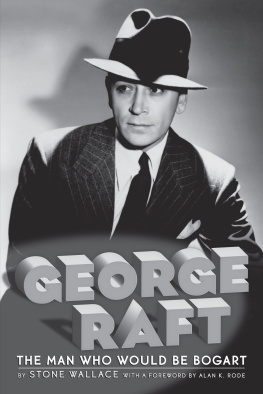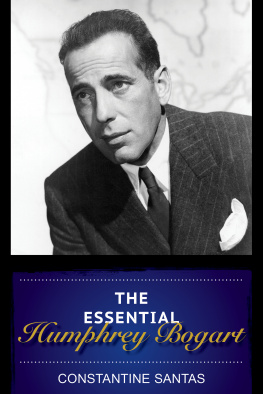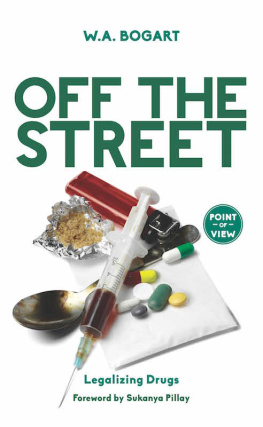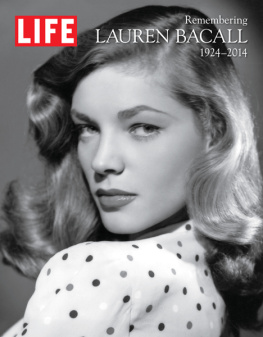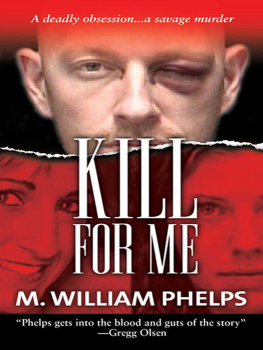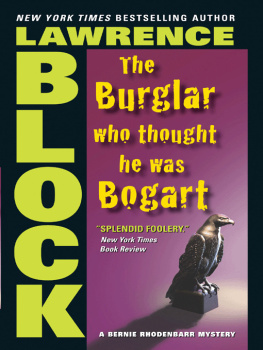Humphrey Bogart
David Thomson is, among many other things, author of The New Biographical Dictionary of Film, now in its fourth edition. His recent books include a biography of Nicole Kidman, completing and editing Fan Tan (a novel started by Marlon Brando and Donald Cammell) and The Whole Equation: A History of Hollywood. His latest work is the acclaimed Have You Seen? A Personal Introduction to 1,000 Films. Born in London, he now lives in San Francisco.
PENGUIN BOOKS GREAT STARS
David Thomson
Humphrey Bogart
Ingrid Bergman
Gary Cooper
Bette Davis
Humphrey Bogart
DAVID THOMSON
Photo research by Lucy Gray

GREAT STARS
For Sean Arnold
PENGUIN BOOKS
Published by the Penguin Group
Penguin Books Ltd, 80 Strand, London WC2R 0RL , England
Penguin Group (USA) Inc., 375 Hudson Street, New York, New York 10014, USA
Penguin Group (Canada), 90 Eglinton Avenue East, Suite 700, Toronto, Ontario, Canada M4P 2Y3 (a division of Pearson Penguin Canada Inc.)
Penguin Ireland, 25 St Stephens Green, Dublin 2, Ireland (a division of Penguin Books Ltd)
Penguin Group (Australia), 250 Camberwell Road, Camberwell, Victoria 3124, Australia (a division of Pearson Australia Group Pty Ltd)
Penguin Books India Pvt Ltd, 11 Community Centre, Panchsheel Park, New Delhi 110 017, India
Penguin Group (NZ), 67 Apollo Drive, Rosedale, North Shore 0632, New Zealand (a division of Pearson New Zealand Ltd)
Penguin Books (South Africa) (Pty) Ltd, 24 Sturdee Avenue, Rosebank, Johannesburg 2196, South Africa
Penguin Books Ltd, Registered Offices: 80 Strand, London WC2R 0RL , England
www.penguin.com
First published 2009
Copyright David Thomson, 2009
All rights reserved
The moral right of the author has been asserted
Except in the United States of America, this book is sold subject to the condition that it shall not, by way of trade or otherwise, be lent, re-sold, hired out, or otherwise circulated without the publishers prior consent in any form of binding or cover other than that in which it is published and without a similar condition including this condition being imposed on the subsequent purchaser
ISBN: 978-0-14-193147-0
Look, Im hardly pretty, he seems to say. I sound like gravel; I look rough and tough; and, honest, I dont give you the soft, foolish answers the pretty boys will give you. You may not like what I say, but you better believe it. I know, Im a star in a funny kind of way, but not because I set out to be one, and not because I sold out. Honest.
It all works as a speech until you look at the imploring eyes, longing to be believed, trying to believe.
Actors should keep in work as steadily as possible that or drink make the best recipe for avoiding eye contact or any friction of the soul with that treacherous shadow to which they may find themselves attached, their image. In the case of Humphrey Bogart Bogie, they used to say, out of respect the shadow was a rugged ideal. It was everything he wanted to be which means everything a kid from World War I could dream of. We are talking about an age of such idealism that it can look foolish now. Yet when his time came, at last, and when he had the most glorious, obedient sexpot in tow a guy in his forties and losing his hair could ever imagine, why Bogie took the whole package for a while, on the chin. But then he soured, as if to admit the ideal was a killer, more than any man could survive.
He died short of sixty, and convention said it was from the smoking and the booze and the not taking care of himself. Maybe it was just possessing too much irony or common sense to endure being a pliable ghost in strangers dreams Bogie. But then for thirty years after his death, that image grew clearer and more immaculate it became an emblem of American cinema and stoicism, and inasmuch as Rick in Casablanca stood for initial American wariness or neutrality coming to realize the justice of the war, why Bogart fell in line with what we would one day call the best generation. The one that knew the difference between a hill of beans and a mountain of dead bodies. The one that winced if you said best and had a suitably cynical wisecrack waiting on the big word. And for twenty years or so, Bogie was untouchable, not just the best but dismissive and corrosive enough to strip out all the pomp, smugness and medals that went with it. He made the kids films of America seem grown up.
He was good enough to have played Ernest Hemingway for real. But dont forget that Hemingway shot himself at the dawn of that age when Americans started to shoot their own heroes, as if the cult of being best was getting out of hand.
He was named Humphrey De Forest Bogart, and he was born on Christmas Day, 1899, to parents who featured in the New York Blue Book. Louise Brooks, who knew him quite well in the mid-20s, saw a Humphrey (a very respectable name) and a rather slight, morbidly beautiful dark-haired youth who was trying to behave as his family expected. The father was a successful surgeon, though a man who went in great pain from a riding accident and who was accustomed to inject himself with morphine when the pain became too much. He provided the same service for his wife, Maud Humphrey, who was a very successful illustrator of childrens books. Her professional income was said to be $50,000 a year, and she sometimes chose Humphrey as one of her angelic models.
The family had a large house in Manhattan (just off Riverside Drive) and a country house at Seneca Point on Candaigua Lake in the western reach of upstate New York. It was there that the boy found his lifelong love of sailing. He was known for tidy looks and perfect manners, and there is little early sign that his need to model for his mothers lucrative but idealized drawings made him more sceptical or critical. More than nearly any other film star, Bogart came from real class and grew up without finding need or reason to challenge that slightly anti-American distinction. He spoke very well, and you can hear that sometimes in his famous roles. For although this Bogart mixed with people like Ugarte, Eddie the drunk and Brigid OShaughnessy, still the actor had a quiet, orderly respect for protocol and grammar that contrasted nicely with his tart tongue. Rick has knocked around the world, but he has been educated. Think of Marlowes meeting with General Sternwood in the hot-house at the start of The Big Sleep he will be drenched in his own sweat; he utters some sour one-liners; he knows the underworld, it seems. Yet he knows Sternwoods world, too, and he impresses the general as a man to be saluted. After all, his Philip Marlowe is a modern knight, serving the good for a very modest daily wage, often doubting the imitations of virtue, but always seeing it when it is for real as in the forlorn figure of Harry Jones (Elisha Cook Jr). This Bogart may have given up on the world of class and etiquette, but he remembers it, and he never really betrays it. What Im trying to say is that if Bogart had suddenly been cast as an American gentleman FDR, Dean Acheson, or Faulkner hed have carried it off. His Marlowe a figure of immense caustic integrity is not so far from figures like Bulldog Drummond and even James Bond. In the great turmoil of that films story, Marlowe and his forward motion can be trusted. Marlowe, we should remember, was the creation of a failed but dreamy English public schoolboy who cherished Edwardian codes of honour and service.
If you want another point of reference think of Gore Vidal, a natural wit, glowingly intelligent, and plainly from class. Of course, Vidal never needed university, and never embraced Bogies macho mannerisms. But Vidal made up his own lines.
Next page

